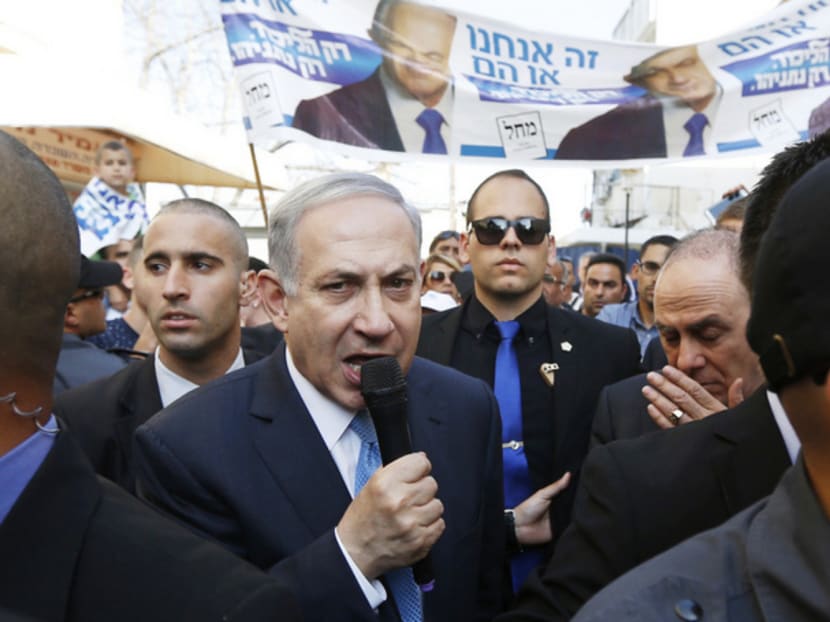As Israel votes, Netanyahu takes swipe at Arabs
JERUSALEM — With his political future in question, Israeli Prime Minister Benjamin Netanyahu yesterday made a list-ditch appeal to hard-liners as the country went to the polls in a tight parliamentary election, saying that high Arab voter turnout was endangering his right wing party’s dominance.

Israel's Prime Minister Benjamin Netanyahu (2nd L) campaigns in the southern city of Ashkelon March 17, 2015. Millions of Israelis voted on Tuesday in a tightly fought election, with Netanyahu facing an uphill battle to defeat a strong campaign by the centre-left opposition to deny him a fourth term in office. REUTERS/Baz Ratner (ISRAEL - Tags: POLITICS ELECTIONS)
JERUSALEM — With his political future in question, Israeli Prime Minister Benjamin Netanyahu yesterday made a list-ditch appeal to hard-liners as the country went to the polls in a tight parliamentary election, saying that high Arab voter turnout was endangering his right wing party’s dominance.
Surveys indicate the election is too close to call. Most show Mr Netanyahu’s Likud party trailing opposition leader Isaac Herzog’s Zionist Union by three or four of Parliament’s 120 seats, with both falling far short of a majority.
But amid signs that his six-year reign could be in jeopardy, Mr Netanyahu has veered sharply to the right in the closing days of the campaign. Yesterday, he reiterated a pledge to prevent the establishment of a Palestinian state — backtracking from six years of his own policy and putting him at odds with the United States and other Western allies.
At midday, Mr Netanyahu claimed high Arab voter turnout was putting his right wing Likud Party’s rule “in danger”, according to a posting on his Facebook page. “Arab voters are going to the polls in droves. Left-wing organisations are bringing them in buses,” he said.
He also called on supporters to vote for him to “narrow the gap” between Likud and the Zionist Union. “With your help, and with the help of God, we will build a nationalist government that will protect the state of Israel,” he said.
Mr Netanyahu’s comments towards Israeli Arab voters were remarkable because they targeted Israeli citizens, and they quickly attracted accusations of racism. Israel’s Arabs, who make up 20 per cent of the population, have long complained of discrimination. A new joint list of Arab parties, unifying four factions, has energised Arab voters and is poised to make big gains in the race.
Mr Herzog — Mr Netanyahu’s main challenger — has promised to revive peace efforts with the Palestinians, repair ties with the US and reduce the growing gaps between rich and poor.
“Whoever wants to follow (Netanyahu’s) path of despair and disappointment will vote for him,” Mr Herzog said after casting his vote. “But whoever wants change, hope, and really a better future for Israel, will vote the Zionist Union led by me.”
Israeli election officials said 26.5 per cent of eligible voters had voted by midday, a rate similar to previous years.
While exit poll results were expected after the end of voting at 10pm local time (4am this morning Singapore time), the true results may not be known for weeks.
Israelis vote for parties, not individual candidates. No party has ever won a majority in the 120-member Parliament, so after an election, it can take weeks of negotiations to form a governing coalition. Several smaller centrist and religious parties that have not pledged support for either Mr Netanyahu or Mr Herzog will likely tip the scales to determine who will become Prime Minister.
Mr Netanyahu has governed for the past six years and has long been the most dominant personality in Israeli politics. He has swung further to the right in the final stages of the campaign, complaining of an international conspiracy funded by wealthy foreigners to oust him, and warning of a “left-wing government supported by the Arabs”. AGENCIES






